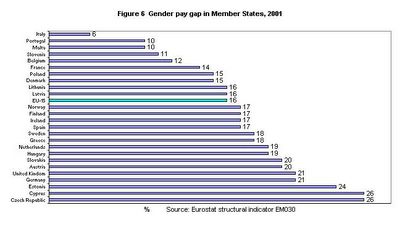Working motherhood getting you down? Fed up with living in a country where you're made to feel like a bit of a slacker for getting pregnant?
Well, don't move to Sweden. The Nordic country may have been boasting for decades about its fantastic parental pay and rights packages and its nurseries on every street corner, but according to a leading academic in the field, we have all been duped. Dr Catherine Hakim, a sociologist at the London School of Economics who specialises in women's employment and women's issues, says in a book out this week that what we have been told about the Swedish experience amounts to "true lies".
While it might be 'technically true' that women benefit from all sorts of legislative protections, it seems that women are paying a price for childbearing. There is 'a pay threshold in Nordic countries below which are 80% of all women, and above which are 80% of all men.'
"What is more, the glass ceiling problem is larger in family-friendly Sweden than it is in the hire-and-fire-at-will US, and it has also grown as family-friendly policies have expanded. In Sweden 1.5% of senior management are women, compared with 11% in the US."
Apparently, Hakim reckons that there is a roughly 20% wage gap in Sweden, which is not a particularly good showing.
Well this is all a little shocking to me, given my overly-romantic Nordo-phile partiality. On the wage gap, it seems that Hakin is roughly correct. According to a report from the European Foundation for Living and Working Conditions,European pay gender gaps break down as follows:

Sweden is marginally, but not significantly better on the pay gap front than the UK and Germany, and is much much worse than Italy and Portugal (the figures in the table don't tally with the figures in the Guardian. I'm not sure which one is exactly right).
Apparently, Hakim's argument is that
the story of Sweden over the past two decades is the story of a country whose small industries couldn't foot the bill for the ideological parental-rights packages being embraced, and who have largely taken avoiding action when it has come to employing women of childbearing age.
I'm a little perplexed by this. I of course haven't read Hakim's book, so I may not be getting her right. But... While it is one thing to argue that the evidence cited in the article supports the notion that, as Abiola cheekily says, 'time spent looking after kids is time that might have gone to impressing one's bosses and stabbing one's co-workers in the back,' it is quite another to argue that Swedish employers are refusing to employ women who might possible have children. Given that 75% of Swedish women are employed in the public sector, there may be elements of career choice, but I'm not sure that there's evidence about exclusion.
All that these stats require is a loss of working years and more women going part-time after having children (although I have seen stats (I forget where) that control for these things in Europe and still find a pay gap). As Hakim says further in the article, the problem is time: child-rearing and furthering a career are not entirely compatible. If you do the first, and that function tends to fall on women, you will find doing the latter more difficult.
What is to be done? I do wonder, for instance, if hiring and promotion decisions should account for the socially valuable activity of child-rearing. If academic promotions are based, say on publications, then one might be able to account for years worked in one's calculations vis-a-vis publication success. But I suspet the basic question is over whether or not the value of child rearing should require interventions in the labour market in order to remove disincentives, or to prevent the (I'm implausibly assuming) inadvertant disadvantages that child-rearers suffer.
No comments:
Post a Comment